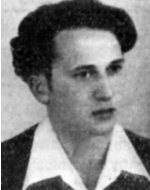Peribolski, Dov (Berla)
Son of Yenta and Menashe-Yitzhak, was born on January 15, 1927 in the city of Kosov-Polski, Poland. He studied for a few years in an elementary school and then worked in self-study. During World War II, when the city was conquered by the Germans, he fled with his older brother to the forest and joined the Jewish partisans. They experienced many hardships and were always in fear. The Russian partisans fought the Jewish partisans and demanded that they surrender their weapons. The Jews hid their weapons and sent a delegation – including Dov’s older brother – to the Russian partisans, but they were about to execute the members of the delegation. 15-year-old Berla ran after them and shouted that they would kill him too, because his brother was the only one left of the entire family that had been destroyed. The Russians felt sorry for the boy and released his brother, but the rest were executed. When a special order was received from Russia, the Russian partisans united with the Jews and fought together against the Germans. Berla fought in their ranks and later moved with them to Russia. In 1946 he immigrated to Israel on the ship “Shachar”. The ship was captured by the British and its members were exiled to Cyprus. From Cyprus he tried twice to penetrate the country and did not succeed, until finally he managed to reach Israel on July 15, 1948. When they tried to persuade him to delay his immigration from Cyprus, because in the country they would immediately recruit him to the army, he replied: “We fought in foreign countries – why should not we fight for our country?” Immediately upon his arrival in Israel he joined the ranks of the Palmach, the Harel Brigade, served as a lieutenant colonel, and took part in operations on the Jerusalem and Negev fronts. Dov was a tall lad and a gentle expression of seriousness lay on his handsome face. Full of energy and full of love for his friends. In the few months he had been in Israel, he had known a great deal about her manners and ways. In the last separation from the family he said: “If I stay alive, I will see you, and if not, I will stay in the Negev …” During Operation Horev to remove the Egyptian army from Israel, He received an order to leave the battlefield, but he continued to serve as a lieutenant colonel, until he was hit in the head with two bullets, and fell – after living half a year in Israel – on the 5th of Tevet 5709 (6.1.1949). Remained in Egyptian territory. After a while he was put to rest in the military cemetery in Haifa.
